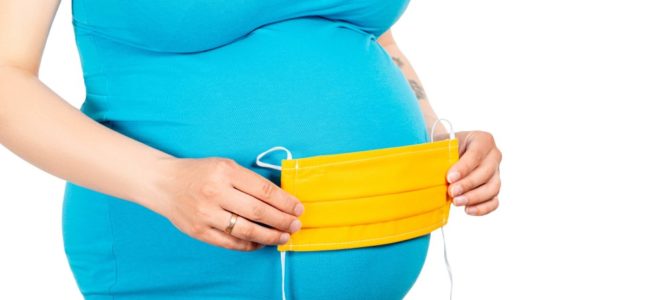
Once upon a time, way back in 2019, it was considered virtuous for pregnant women to obsessively Google or ask their doctors about every behavior that might conceivably affect their baby. Is it okay to go swimming? To eat lunch meat? To use hairspray?
Over the course of mere months, however, one behavior has become taboo to question as “safe” for pregnancy: mask-wearing.
The TV screen in my OB-GYN’s waiting room says it’s safe, after all. The World Health Organization recommends pregnant women “wear a non-medical, fabric mask” where physical distancing isn’t possible, while the Centers for Disease control unequivocally states that pregnant women can and should wear cloth masks.
If the CDC and WHO abided by their own standards of evidence in use before the pandemic, however, they wouldn’t have jumped to recommend masks without so much as a caveat about the unknown level of safety of long-term mask use in pregnancy. The CDC comments in a page last reviewed in October 2019 that some masks “make it harder to breathe,” and “this can sometimes cause difficulties (particularly late in pregnancy).”
Summarized on a linked CDC page is a one-hour study of N95 masks during rest and exercise, which found “the effects were mild” and there was no difference in effect between pregnant and non-pregnant women. The CDC noted that “more studies are needed to find out if there are any additional effects from wearing an N95 FFR for longer periods of time.”
That page did not mention another study conducted in 2015 of 20 pregnant health-care workers in mid-pregnancy, which showed “a decrease [in] oxygen uptake and increase [in] carbon dioxide production as a result of the increased workload on breathing imposed by mask use, both at rest and low work intensity.”
In researching this topic, I could find only a handful of studies on mask use in pregnant women, and none on the cloth face masks recommended to this group. Neither could I find any studies with observation periods longer than an hour, much less studies of the long-term impacts of maternal mask use on child development (like the scores we have for drug and alcohol use).
Even if those studies exist, neither the CDC nor the WHO have cited any robust study that says, “Yes, long-term mask use during pregnancy is safe for mother and baby.” Millions of pregnant women are now guinea pigs for mask use, without health organizations or government agencies even having the decency to be honest about it.
Indeed, the claim that frequent mask use for extended periods of time is “completely harmless” to the general public has already broken down: “Mask mouth” puts frequent mask wearers on the path to gum disease, which in other contexts has been found to be connected to other serious health problems, like heart disease, diabetes, and premature birth.
The contention that COVID is so dangerous it’s worth engaging in an untested behavior in an attempt to avoid it doesn’t hold water, either. The CDC has been tracking pregnancy and birth outcomes for women and babies with COVID, including birth defects and pregnancy loss. The most its November report could conclude is that pregnant women with COVID “might be at risk for preterm birth.” A July 2020 systematic review of published studies found “insufficient good-quality data to draw unbiased conclusions” on COVID-related health outcomes for mothers and infants.
Neither the WHO nor CDC recommended face coverings for pregnant women (except health-care workers) with the H1N1 outbreak despite the fact that the H1N1 fatality rate among pregnant women was far higher than from other influenza types, and the favorable results for mask-wearing from the first randomized controlled trial of mask use in households came out in 2008. In addition, numerous transmission studies of mask use over the last decade (see this compilation of studies with moderate to high quality of evidence by the WHO) have found against mask efficacy.
For mask use, there should be high demand for clear evidence of safety for pregnant women and their babies—the same level of evidence the CDC demands of virtually every other health-related behavior in pregnancy. Just compare the CDC and WHO’s unflinching support for something so poorly studied to their abstinence-only approach to alcohol use, despite studies of thousands of pregnancies showing no significant effect of minimal drinking on babies’ health.
If the CDC and WHO were consistent, they would treat long-term mask use by pregnant women more like they treat alcohol use: there’s no definitive evidence that it’s safe, and therefore it cannot be endorsed.









